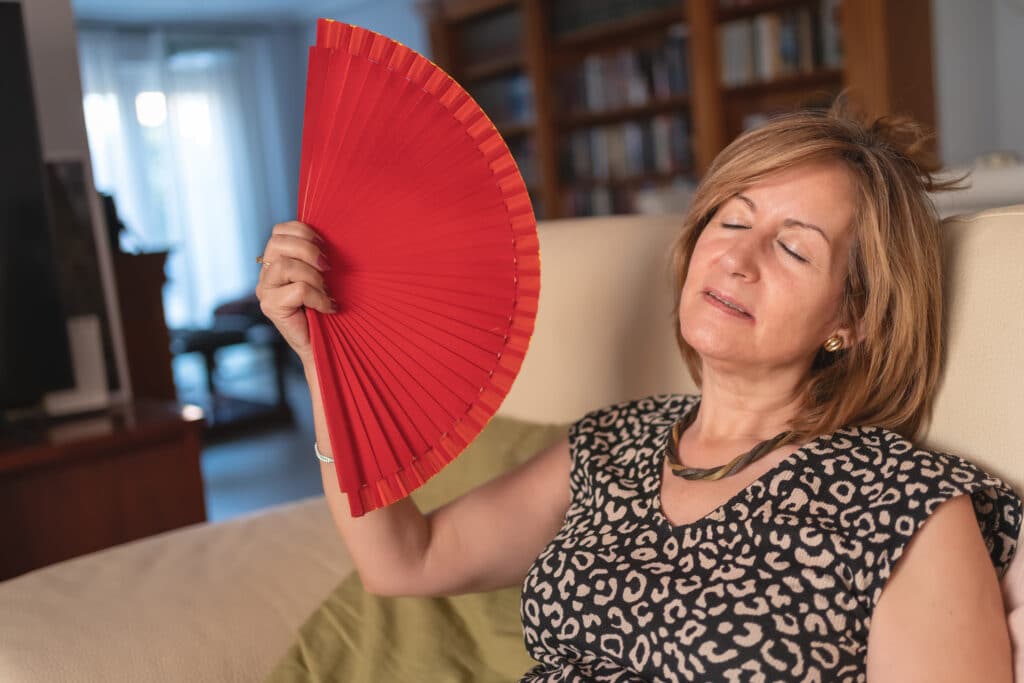So many women wonder what are the symptoms of menopause or the signs of peri-menopause.
And many women wonder what age peri-menopause symptoms start and when is the average age of menopause.

The truth is that what we think of as “menopause” is usually the time that is called “peri-menopause“.
When we think about the symptoms and the average age of menopause we have to distinguish between peri-menopause and menopause. Because they are very different.
Peri-menopause is a time of transition. Menopause is one day.
Peri-menopause usually begins when women are in their late 30s to early 40s.
It marks a long transition as we phase out of being of reproductive years to being post-menopausal.
For some women, peri-menopause can last for 10-12 years.
So what are the signs of peri-menopause?
Some of the signs of peri-menopause include the following:
- Mood changes or mood swings
- Sleep disruption
- Reduced libido
- Vaginal dryness
- Night sweats
- Hot flashes
- PMS-like symptoms such as breast tenderness, skin flares, irritability
- Headaches
- Trouble concentrating
- Heavy sweating
- Weight gain
- Fatigue
- Difficulty coping with stress
It is important to note that many of the symptoms of peri-menopause can be attributed to other causes.
For example, if someone has an underactive thyroid (hypothyroidism) this can cause weight gain, mood issues, trouble sleeping, or fatigue.
And if you were to address the thyroid levels you might be able to alleviate some of those symptoms.
It’s also important to note that hormones do not act alone.
It is better to think of hormones as doing a graceful dance. If one hormone gets out of whack it can affect a whole line of other hormones.
So addressing hormonal imbalances requires a holistic approach.
What causes peri-menopause symptoms?
The most common cause of early peri-menopause symptoms is low progesterone.
When our hormones are balanced progesterone and estrogen stabilize each other.
As we enter our late 30s and early 40s our progesterone levels begin to drop and this causes estrogen to be unattended.
So, even if you have low estrogen levels, if your progesterone is low relative to estrogen, then you may experience what is known as estrogen dominance.
And estrogen dominance is the root cause of a lot of the symptoms listed above.
So the main recommendation for women in their early peri-menopausal time is to naturally increase progesterone levels.
And this can be done quite effectively with botanicals.
Boosting progesterone can help improve sleep dramatically.
It can also regulate your mood and potentially can help with weight gain issues.
As we get closer to menopause we may suffer from low estrogen and low testosterone as well.
This can cause all kinds of symptoms that are actually quite treatable with lifestyle modifications, carefully selected supplements, and hormone therapy.
For most women that are relatively healthy, there is no reason to suffer through peri-menopause!!

What are the signs of menopause?
Or a better question is “What is menopause”?
As I noted above, menopause is actually just one day.
It is exactly one year from the first day of your last period.
So, if you had your last period on May 1, 2022, and you haven’t had any bleeding throughout the whole year, then May 1, 2023, is your day of menopause.
Therefore, we can’t really define the “signs of menopause”.
But we CAN define common symptoms of post-menopause.
What happens post-menopause, again, varies greatly and can be dependent on many other factors and your overall health.
But generally, after menopause estrogen and progesterone levels remain consistently low.
Therefore, we may have some of the same signs we had during peri-menopause!
Although treatment approaches should be slightly different from those during peri-menopause, there are many ways to address hormones at this stage of life.
There is no reason that women should suffer from post-menopause symptoms!
Although many doctors act like it’s a big mystery, we have a very good understanding of what happens during peri- and post-menopause.
We know that it requires a holistic approach and we can easily measure individual hormone levels.
There is hope!!
So, don’t let any doctor tell you that “It’s just part of getting old”. Or “It’s just your hormones”.
Don’t settle!
If you are someone that is not willing to settle for suffering through these important transitions in your life, then I recommend you check out our “Sail Through Peri-Menopause” program.
This program is a high-touch, fully supportive program for women that are ready to commit to making lifestyle changes to optimize their health.
AND for those women that recognize the importance of personalizing the approach and working with professionals who understand this phase of life.
We are here to help!
Just click the link below to learn more.
